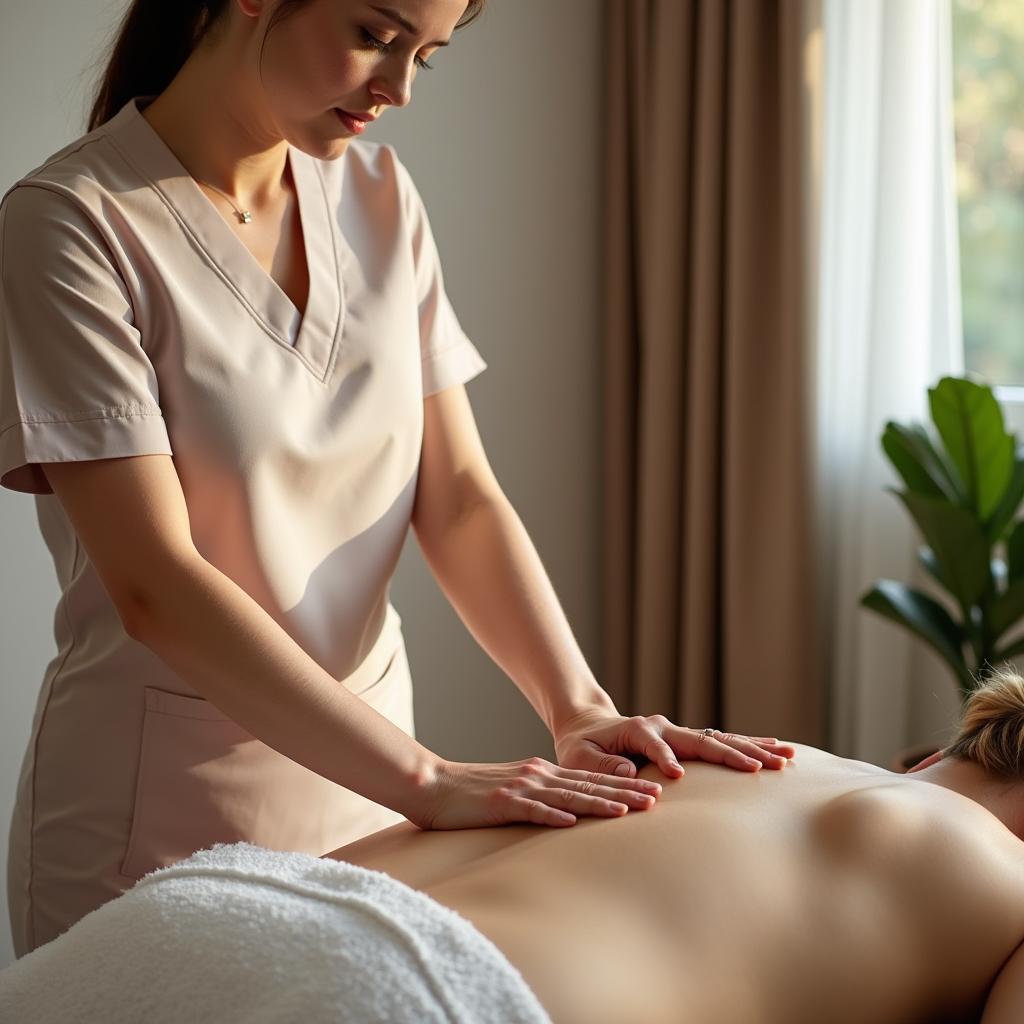Massage therapy is a crucial topic in the health and wellness field, often appearing in IELTS exams. Let’s dive into the vocabulary, usage, and techniques to help you excel in your IELTS preparation.
Understanding “Massage Therapy”
Definition: Massage therapy is a hands-on technique that involves manipulating the body’s soft tissues to promote relaxation, reduce stress, and alleviate pain.

Part of Speech: Noun phrase
Pronunciation: /məˈsɑːʒ ˈθerəpi/
Context and Usage
- Example: The massage therapy session helped alleviate her chronic back pain.
Analysis: This sentence demonstrates the therapeutic benefits of massage therapy in addressing specific health issues. - Example: Many athletes incorporate massage therapy into their recovery routines.
Analysis: This usage highlights the relevance of massage therapy in sports and athletic performance, which is often a topic in IELTS Sports Therapy discussions.
- Example: The spa offers various massage therapy treatments, including Swedish and deep tissue massages.
Analysis: This example showcases the diversity of massage therapy techniques, which could be useful in IELTS Writing Task 2 when discussing health and wellness topics. - Example: Studies have shown that regular massage therapy can contribute to improved mental health and stress reduction.
Analysis: This sentence links massage therapy to mental health benefits, a connection that could be valuable in IELTS Speaking Part 3 when discussing holistic health approaches. - Example: The hospital’s rehabilitation program includes massage therapy as part of its integrative medicine approach.
Analysis: This usage demonstrates how massage therapy is incorporated into mainstream medical practices, which could be relevant in IELTS Academic Reading passages about healthcare innovations.
Frequency in IELTS
“Massage therapy” appears moderately in IELTS exams, particularly in:
- Reading passages about health and wellness
- Listening sections discussing lifestyle or medical treatments
- Speaking Part 2 topics related to relaxation or health practices
- Writing Task 2 essays on alternative medicine or stress management
Vocabulary Analysis
Word Structure
- “Massage” (noun/verb) + “Therapy” (noun)
- The compound structure emphasizes both the action (massage) and its purpose (therapy)
Synonyms and Antonyms
- Synonyms:
- Manual therapy /ˈmænjuəl ˈθerəpi/ (noun): Hands-on treatment of muscle and joint problems
- Bodywork /ˈbɒdiˌwɜːk/ (noun): Various forms of touch therapy
- Therapeutic touch /ˌθerəˈpjuːtɪk tʌtʃ/ (noun phrase): A healing practice involving gentle touching
- Related Terms:
- Physical therapy /ˈfɪzɪkəl ˈθerəpi/ (noun): Treatment of injury or dysfunction with physical methods
- Osteopathy /ˌɒstiˈɒpəθi/ (noun): A type of alternative medicine focusing on the musculoskeletal system
- Antonyms:
- Pharmacotherapy /ˌfɑːməkəʊˈθerəpi/ (noun): Treatment using pharmaceutical drugs
- Surgical intervention /ˈsɜːdʒɪkəl ˌɪntəˈvenʃən/ (noun phrase): Treatment involving surgery
Memorization Techniques
Mind Mapping
Create a mind map with “Massage Therapy” at the center, branching out to:
- Types (Swedish, Deep Tissue, Sports)
- Benefits (Relaxation, Pain Relief, Muscle Recovery)
- Techniques (Kneading, Stroking, Percussion)
- Settings (Spa, Clinic, Sports Facility)
Storytelling
Imagine a stressed athlete who undergoes massage therapy as part of their recovery routine. The therapist uses various techniques to target specific muscle groups, leading to improved performance and reduced injury risk.
Practice Exercises
- Sentence Formation:
Create sentences using “massage therapy” and related terms in different contexts (e.g., sports, healthcare, wellness). - Paragraph Writing:
Write a short paragraph about the benefits of massage therapy in stress management, incorporating at least three related vocabulary terms. - IELTS-style Task 2 Essay:
“Some people believe that alternative therapies like massage therapy should be covered by health insurance. To what extent do you agree or disagree?” - Speaking Practice:
Describe a time when you or someone you know benefited from massage therapy. Use this as preparation for IELTS Speaking Part 2. - Vocabulary Extension:
Research and list tools used in massage therapy (e.g., massage table, foam roller, essential oils) to expand your topic-specific vocabulary.
Conclusion
Mastering the vocabulary and context of “massage therapy” can significantly enhance your IELTS performance, especially in health and wellness-related topics. Remember to practice using these terms in various contexts and to explore related concepts to build a comprehensive understanding.
We encourage you to apply these new vocabulary items in your IELTS preparation immediately. Share your experiences or any questions about using “massage therapy” and related terms in the comments section below. How has this guide helped you in your IELTS journey?